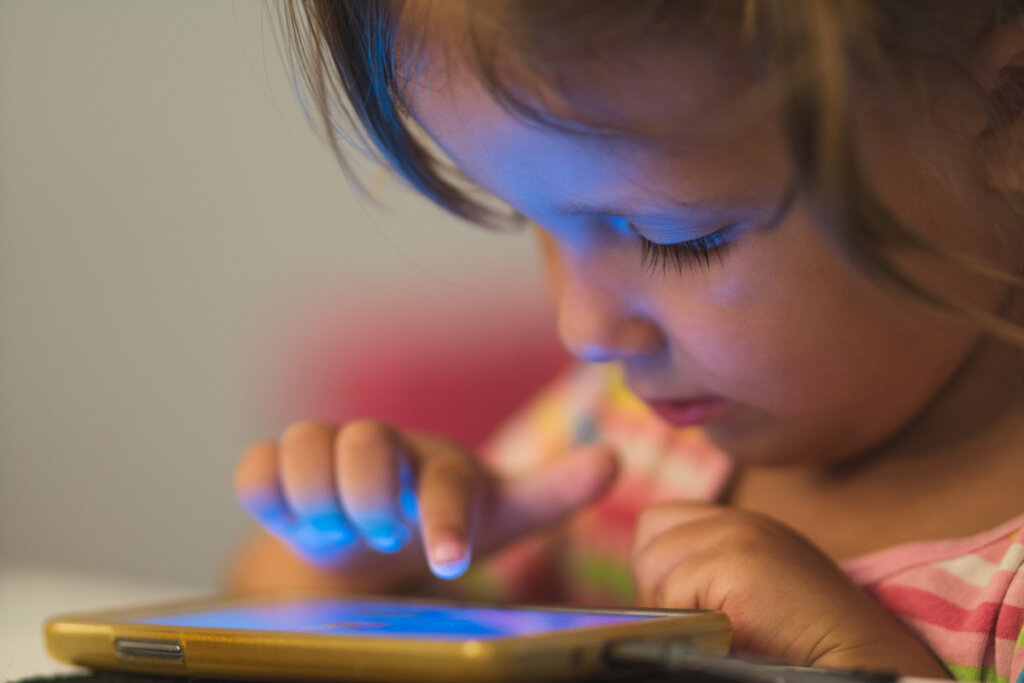Why Children Shouldn't Watch The Squid Game


Written and verified by the psychologist Valeria Sabater
Why shouldn’t children watch The Squid Game? As a matter of fact, the answer couldn’t be simpler. It’s far too violent. However, it’s not enough to simply make this rather obvious statement. We need to explain why young people shouldn’t be exposed to this type of production that they’re not yet capable of processing.
Everyone now knows about this Netflix series. It has millions of viewers and there isn’t a day that goes by when it isn’t talked about. Nevertheless, we can’t ignore the impact that it’s having on the little ones. In fact, in the last month, kindergarten and elementary school teachers have watched in amazement as their students have recreated the games in the schoolyard.
This is happening everywhere, from the US to Europe and Asia. Indeed, educators have raised the alarm at an undeniable fact: the permissiveness of parents who don’t control or filter what their children see. In fact, The Squid Game is a production not recommended for children under 16 years of age. However, despite this fact, it’s already been seen by children as young as three years old.
The Squid Game series can only be seen and understood through the eyes of an adult. Because only adults can understand the social pressures of South Korea, their class struggles, and their competitiveness. Furthermore, the frustration of those who have nothing and who yearn to win a prize in the ultimate game show.

Reasons why children shouldn’t watch The Squid Game
Ever since television started to make an appearance in family homes, psychology has been interested in understanding the impact of certain of its content on children’s minds. This concern increased in the 1970s when the psychologist Albert Bandura showed us how social learning and imitation are key to whether or not children develop aggressive behaviors. In fact, what they see, especially if it’s attractive to them in some way, they’ll put into practice. They imitate it.
In the 1980s, psychologists L. Rowell Huesmann and Leonard Eron conducted some noteworthy research in this area. They discovered that the greater the exposure to violent content in primary school, the greater the likelihood that aggressive behaviors will develop in secondary school. Therefore, we might say that no audiovisual content orchestrated by violence is ever entirely innocuous in the mind of a child.
This invites us to reflect in-depth as to why children shouldn’t watch the Squid Game. Let’s take a look.
Childish aesthetics where violence is normalized
The series presents a striking aesthetic and iconography in the eyes of a child. Indeed, it’s extremely easy for them to immerse themselves in a universe of games. Furthermore, it’s in a setting where the characters wear bright colors and masks of geometric figures, etc. Therefore, children get caught up in this visual world, despite the fact that the images are accompanied by violent acts.
The familiar (the games) is combined with the different (the violence ). In effect, this means that both are watered down and become one and the same thing. This has caused educators to witness troubling scenes. In Belgium, for example, they’ve seen how children who played the game red light green light in the schoolyard, ended up, as a group, beating the losers.
Furthermore, in the UK, at Sir Francis Hill Primary School in Lincoln, six-year-olds reenacted scenes and discussed them. Likewise, pre-teens of nine, ten, and eleven years old have become familiar with the series through Tik Tok, where it’s trending, as well as on YouTube.
A child’s mind doesn’t understand the social background of the series
In order to understand why children shouldn’t watch The Squid Game, we basically need to consider the cognitive and emotional development of children. Furthermore, we need to take into account that not even preadolescents are prepared for this production. That’s because they haven’t yet developed an adequate sense of critical thinking.
For this reason, their minds only appreciate the violence. They don’t take into account the personal drama of the characters, their relationships, or the background behind these bloody games. As a matter of fact, this is a production that isn’t comfortable for everyone to watch. Indeed, many adults feel unable to watch it due to its severity.
Behavioral imitation
Children imitate what they see in their own games. With this show, they see content that seems familiar to them and that they can represent in their schoolyards. What’s more, the aesthetic is both simple and gimmicky at the same time. Hence, many children have asked their parents if they can get dressed up for Halloween in outfits from The Squid Game.
As if that weren’t enough, there’s another element. This involves the challenges on Tik Tok. On this Internet platform, elementary school children and pre-teens challenge each other to imitate certain scenes from the series, such as the honeycomb challenge. They have to make those cookies with caramelized sugar and there’s already been more than one accident in the process.
Schools have sent notifications to parents not to let their children watch The Squid Game. But the truth is that they’ll inevitably be exposed to the content of this show.

The need to generate a dialogue with children who’ve watched the series
There are still some parents who wonder why their children shouldn’t watch The Squid Game. For many, it’s just one more show on Netflix. After all, at the end of the day, if a seven or eleven-year-old spends hours on Fortnite or playing violent video games, what’s the worry over this series?
The problem lies in the lack of filters and these parents’ inability to understand that everything to which a child is exposed has a psychological impact on them. It’s a fact that The Squid Game isn’t a suitable or recommended program for children under 16 years of age. However, unfortunately, a problem already exists in the classrooms and the schoolyards, because many children have seen the series.
This means that educators must undertake more in-depth readings of this particular show with their pupils. They must talk to them, reformulate certain of its aspects, and give them some lessons in understanding it and its context. Because violence should never be an instrument for its own end. Violence is never permissible. Even less so, is it ever a game.
Why shouldn’t children watch The Squid Game? As a matter of fact, the answer couldn’t be simpler. It’s far too violent. However, it’s not enough to simply make this rather obvious statement. We need to explain why young people shouldn’t be exposed to this type of production that they’re not yet capable of processing.
Everyone now knows about this Netflix series. It has millions of viewers and there isn’t a day that goes by when it isn’t talked about. Nevertheless, we can’t ignore the impact that it’s having on the little ones. In fact, in the last month, kindergarten and elementary school teachers have watched in amazement as their students have recreated the games in the schoolyard.
This is happening everywhere, from the US to Europe and Asia. Indeed, educators have raised the alarm at an undeniable fact: the permissiveness of parents who don’t control or filter what their children see. In fact, The Squid Game is a production not recommended for children under 16 years of age. However, despite this fact, it’s already been seen by children as young as three years old.
The Squid Game series can only be seen and understood through the eyes of an adult. Because only adults can understand the social pressures of South Korea, their class struggles, and their competitiveness. Furthermore, the frustration of those who have nothing and who yearn to win a prize in the ultimate game show.

Reasons why children shouldn’t watch The Squid Game
Ever since television started to make an appearance in family homes, psychology has been interested in understanding the impact of certain of its content on children’s minds. This concern increased in the 1970s when the psychologist Albert Bandura showed us how social learning and imitation are key to whether or not children develop aggressive behaviors. In fact, what they see, especially if it’s attractive to them in some way, they’ll put into practice. They imitate it.
In the 1980s, psychologists L. Rowell Huesmann and Leonard Eron conducted some noteworthy research in this area. They discovered that the greater the exposure to violent content in primary school, the greater the likelihood that aggressive behaviors will develop in secondary school. Therefore, we might say that no audiovisual content orchestrated by violence is ever entirely innocuous in the mind of a child.
This invites us to reflect in-depth as to why children shouldn’t watch the Squid Game. Let’s take a look.
Childish aesthetics where violence is normalized
The series presents a striking aesthetic and iconography in the eyes of a child. Indeed, it’s extremely easy for them to immerse themselves in a universe of games. Furthermore, it’s in a setting where the characters wear bright colors and masks of geometric figures, etc. Therefore, children get caught up in this visual world, despite the fact that the images are accompanied by violent acts.
The familiar (the games) is combined with the different (the violence ). In effect, this means that both are watered down and become one and the same thing. This has caused educators to witness troubling scenes. In Belgium, for example, they’ve seen how children who played the game red light green light in the schoolyard, ended up, as a group, beating the losers.
Furthermore, in the UK, at Sir Francis Hill Primary School in Lincoln, six-year-olds reenacted scenes and discussed them. Likewise, pre-teens of nine, ten, and eleven years old have become familiar with the series through Tik Tok, where it’s trending, as well as on YouTube.
A child’s mind doesn’t understand the social background of the series
In order to understand why children shouldn’t watch The Squid Game, we basically need to consider the cognitive and emotional development of children. Furthermore, we need to take into account that not even preadolescents are prepared for this production. That’s because they haven’t yet developed an adequate sense of critical thinking.
For this reason, their minds only appreciate the violence. They don’t take into account the personal drama of the characters, their relationships, or the background behind these bloody games. As a matter of fact, this is a production that isn’t comfortable for everyone to watch. Indeed, many adults feel unable to watch it due to its severity.
Behavioral imitation
Children imitate what they see in their own games. With this show, they see content that seems familiar to them and that they can represent in their schoolyards. What’s more, the aesthetic is both simple and gimmicky at the same time. Hence, many children have asked their parents if they can get dressed up for Halloween in outfits from The Squid Game.
As if that weren’t enough, there’s another element. This involves the challenges on Tik Tok. On this Internet platform, elementary school children and pre-teens challenge each other to imitate certain scenes from the series, such as the honeycomb challenge. They have to make those cookies with caramelized sugar and there’s already been more than one accident in the process.
Schools have sent notifications to parents not to let their children watch The Squid Game. But the truth is that they’ll inevitably be exposed to the content of this show.

The need to generate a dialogue with children who’ve watched the series
There are still some parents who wonder why their children shouldn’t watch The Squid Game. For many, it’s just one more show on Netflix. After all, at the end of the day, if a seven or eleven-year-old spends hours on Fortnite or playing violent video games, what’s the worry over this series?
The problem lies in the lack of filters and these parents’ inability to understand that everything to which a child is exposed has a psychological impact on them. It’s a fact that The Squid Game isn’t a suitable or recommended program for children under 16 years of age. However, unfortunately, a problem already exists in the classrooms and the schoolyards, because many children have seen the series.
This means that educators must undertake more in-depth readings of this particular show with their pupils. They must talk to them, reformulate certain of its aspects, and give them some lessons in understanding it and its context. Because violence should never be an instrument for its own end. Violence is never permissible. Even less so, is it ever a game.
All cited sources were thoroughly reviewed by our team to ensure their quality, reliability, currency, and validity. The bibliography of this article was considered reliable and of academic or scientific accuracy.
- Huesmann, L. R., & Eron, L. D. (1986). Television and the aggressive child: A cross-national comparison. Hillsdale, NJ: Erlbaum.
- Huesmann, L. R., Moise-Titus, J., Podolski, C. L., & Eron, L. D. (2003). Longitudinal relations between children’s exposure to TV violence and their aggressive and violent behavior in young adulthood: 1977–1992. Developmental Psychology, Vol. 39, No. 2, 201–221.
- Huston, A. C., Donnerstein, E., Fairchild, H., Feshbach, N. D., Katz, P. A., Murray, J. P., Rubinstein, E. A., Wilcox, B. & Zuckerman, D. (1992). Big world, small screen: The role of television in American society. Lincoln, NE: University of Nebraska Press.
This text is provided for informational purposes only and does not replace consultation with a professional. If in doubt, consult your specialist.







